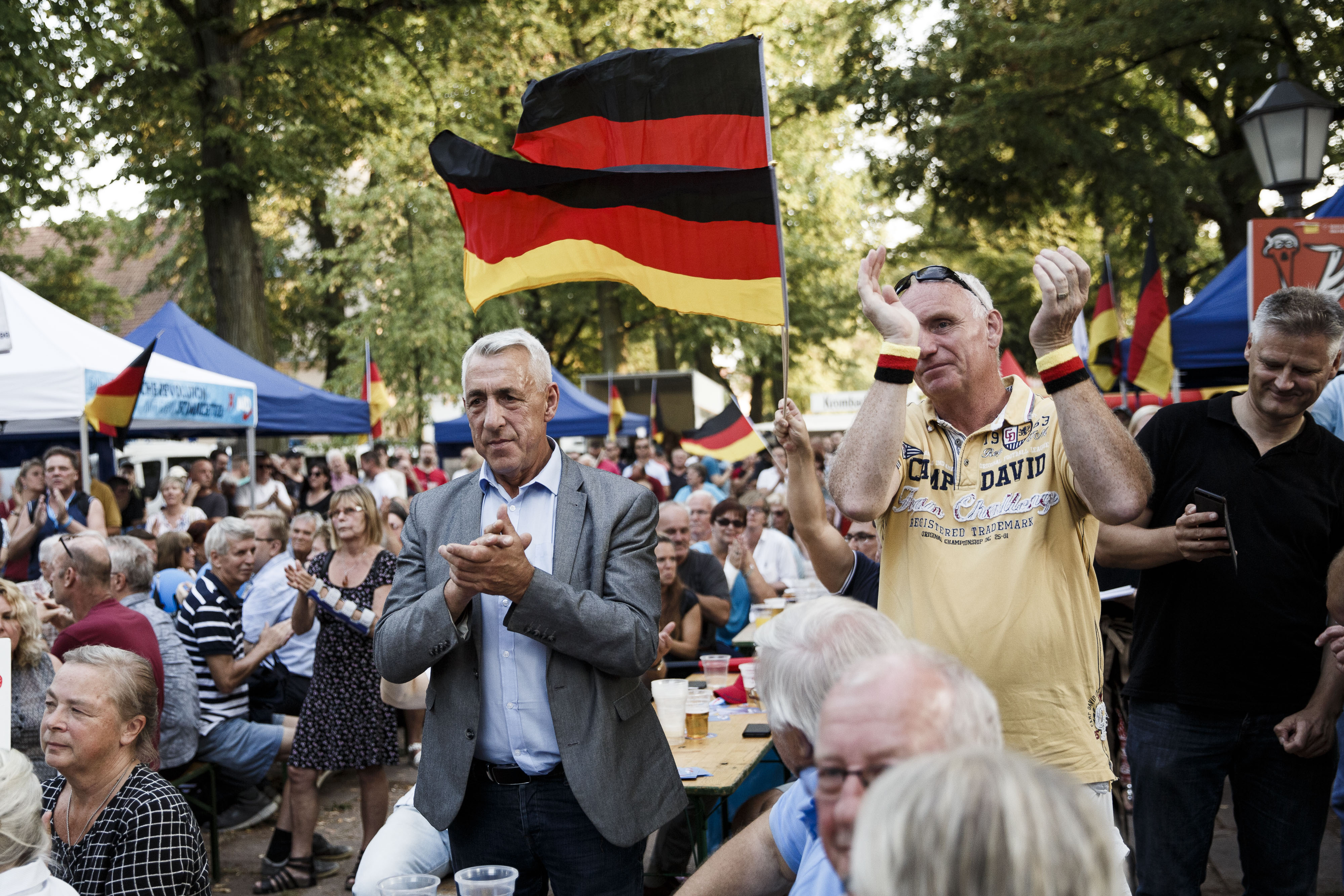Germany's state election results reflect a new search for identity
How a new sort of polarization spells instability for Europe


A free daily email with the biggest news stories of the day – and the best features from TheWeek.com
You are now subscribed
Your newsletter sign-up was successful
Since the outbreak of the second World War 80 years ago, Germany has been a bulwark against the re-emergence of fascism and the far-right. As a consequence, it became an oasis of stability in a shaken Europe. But Germany's politics, like most other European countries, is now in turmoil.
The results of Sunday's state elections in Brandenburg and Saxony show two losers and two winners: The "Altparteien" or the "old parties" — the Social Democrats, who are in fact in free fall, and Merkel's conservative CDU lost out to the right-wing "Alternative für Deutschland" (AfD), which almost became the strongest party in both states, and the Green Party, which managed to gain ground despite the fact that the economically weak east of Germany is traditionally not a winning territory for them.
The results seals two country-wide developments: the continued rise of the AfD and the upswing of the Greens. Although these two parties occupy very different areas of the political landscape, their success has one thing in common: it reflects Germany's growing search for identity and a quest for "Heimat."
The Week
Escape your echo chamber. Get the facts behind the news, plus analysis from multiple perspectives.

Sign up for The Week's Free Newsletters
From our morning news briefing to a weekly Good News Newsletter, get the best of The Week delivered directly to your inbox.
From our morning news briefing to a weekly Good News Newsletter, get the best of The Week delivered directly to your inbox.
"Heimat" is a German word that means much more than just "home." In fact, Heimat can be far away from home. It includes the idea of genuine belonging, and a special connection to the space and people around you. Heimat can be a country, a village, a house, an apartment or even a person. It provides a feeling of security, and is strongly linked to German romanticism, nationalism and the idea of community.
The desire for Heimat becomes stronger once it is threatened, when everything that is familiar could change and vanish forever.
There are two things Germans fear the most at the moment: climate change and immigration. One worry — particularly highlighted by the Greens — is about the exploitation and destruction of our planet, while the other — typically emphasized by AfD supporters — is about the country being overrun by foreigners. In some areas, the worries of these two generally very different groups even overlap, for example, when it comes to confusion in a globalized world and their discomfort toward an unregulated capitalism.
A popular reaction of the first group is to turn toward a sort of romantic conservatism — a withdrawal to a simple life, in commune with nature. This trend has been developing for several years already, and one symptom — not least due to increasing rents in the cities — is that young people are leaving cities to pursue a dream of a remote, conscientious and peaceful life in the countryside. These people are usually well educated, can work remotely and come from a stable, even wealthy background; people with financial security, who belong to an educational elite. They like renovating their houses in an eco-friendly manner and growing their own vegetables.
A free daily email with the biggest news stories of the day – and the best features from TheWeek.com
Then there is the second group, not as worldly, usually not as well educated. But their main fear also centers around the big changes of recent years. Since the refugee influx in 2015, they worry that Germans are becoming a minority in their own county, that the welfare state will be exploited by non-Germans who have never worked and paid for the system, and that political correctness is a way of silencing anyone who speaks the truth, as part of a liberal conspiracy involving mainstream politicians and mainstream media.
These insecurities about change along with a desire for Heimat have manifested in the new political constellation in Germany; one in which the Altparteien are losing ground to the parties that speak to this longing. Certainly, AfD and Greens supporters are polarized on most issues, but they both share a deep distrust of current developments, and long for identity and belonging — and they both find answers in a concept of Heimat that promises comfort and a certain seclusion from an outside world that is perceived as threatening.
What does this mean for Germany and the rest of Europe?
Firstly, it will be increasingly difficult to form stable government coalitions, not only in Brandenburg and Saxony, but also in the rest of the country. Previously, it was usual for one of the big parties — CDU or SPD — to form a coalition with one of the smaller parties such as the FDP or Greens. However, the decline of CDU and SPD makes it difficult to gain a majority — even when they jointly team up for a so-called "Grand Coalition." This means that coalitions need to be formed of more than two or even three parties, and between parties that normally would never have paired up. Of course, one could argue that this is already the case in many European countries (most famously the recent coalition between the "Five Stars" and the Lega in Italy), but this development in the most stable country in Europe will send tremors through the entire continent.
Secondly, if the AfD continues to rise, it is only a question of time until they become part of a government. On the local level, we can already see CDU cooperation with the AfD. Now one could say that this, too, is just a European normality; and in countries such as Poland, Hungary or Italy, the far-right parties are already dominant forces. In France, Marine Le Pen was close to becoming president! However, Germany has for eight decades maintained a strong barrier against right-wing politics. It's a worrying "normalization" when right-wing positions are en vogue again in the country that started WW2 and is responsible for the Holocaust. One asks oneself: If even Germany is falling back into chauvinist nationalism, where are the barriers in other European societies that do not have the same moral obligations as the Germans do (or should have)?
Finally, the deep desire for Heimat in German society suggests that Germany is shedding its old, war-defined identity. There is a desire for a new sense of belonging based on idyllic visions. One is without people from other countries and different skin colors; the other is apart from the alleged evils of a globalized world poisoned by capitalism, climate change, and genetically modified food. Both worlds symbolize a new form of retreat and isolationism, which are the opposite of an open, liberal, and integrative society.
In German society, what we are seeing is a new form of dogmatism as well as growing polarization. However, the parting line is no longer between left and right, but between different identities tied to an idea of Heimat. The consequence is the political reshaping of a country that is often seen as the very last stabilizer of a troubled Europa.
Madhvi Ramani is a writer and editor based in Berlin. Her work has appeared in The New York Times, Washington Post, BBC, and others.
-
 Trump’s EPA kills legal basis for federal climate policy
Trump’s EPA kills legal basis for federal climate policySpeed Read The government’s authority to regulate several planet-warming pollutants has been repealed
-
 Political cartoons for February 13
Political cartoons for February 13Cartoons Friday's political cartoons include rank hypocrisy, name-dropping Trump, and EPA repeals
-
 Palantir's growing influence in the British state
Palantir's growing influence in the British stateThe Explainer Despite winning a £240m MoD contract, the tech company’s links to Peter Mandelson and the UK’s over-reliance on US tech have caused widespread concern
-
 Epstein files topple law CEO, roil UK government
Epstein files topple law CEO, roil UK governmentSpeed Read Peter Mandelson, Britain’s former ambassador to the US, is caught up in the scandal
-
 Iran and US prepare to meet after skirmishes
Iran and US prepare to meet after skirmishesSpeed Read The incident comes amid heightened tensions in the Middle East
-
 Israel retrieves final hostage’s body from Gaza
Israel retrieves final hostage’s body from GazaSpeed Read The 24-year-old police officer was killed during the initial Hamas attack
-
 China’s Xi targets top general in growing purge
China’s Xi targets top general in growing purgeSpeed Read Zhang Youxia is being investigated over ‘grave violations’ of the law
-
 Panama and Canada are negotiating over a crucial copper mine
Panama and Canada are negotiating over a crucial copper mineIn the Spotlight Panama is set to make a final decision on the mine this summer
-
 Why Greenland’s natural resources are nearly impossible to mine
Why Greenland’s natural resources are nearly impossible to mineThe Explainer The country’s natural landscape makes the task extremely difficult
-
 Iran cuts internet as protests escalate
Iran cuts internet as protests escalateSpeed Reada Government buildings across the country have been set on fire
-
 US nabs ‘shadow’ tanker claimed by Russia
US nabs ‘shadow’ tanker claimed by RussiaSpeed Read The ship was one of two vessels seized by the US military
